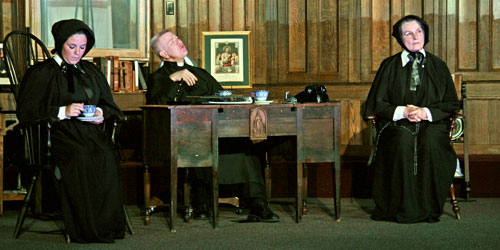By Bridgette M. Redman

The beauty of John Patrick Shanley's "Doubt" is that it is left uncertain whether Father Flynn is guilty of molesting the 12-year-old boy in the school. It is a play rich in subtlety that perfectly balances the situation so that the audience can easily argue for or against the guilt of Father Flynn.
At least, that is the way the play is written. It does not have to be directed that way, and Randy Wolfe of What A Do's production clearly felt that Father Flynn was guilty, even if the two sisters were left wondering at the end.
Perhaps the movie has done permanent damage to what is a near-perfect stage play, for by most accounts, the priest is definitely guilty in the movie whereas the point of the stage play is to question and to highlight the difficulties of these situations. "Doubt" is a well-crafted play with Sister Aloysius, the principal of a school, Sister James, a young nun teaching 8th grade, the parish's priest, Father Flynn, and the mother of a lonely, isolated boy with too many problems on the shoulders of a 12-year-old. Sister Aloysius suspects that Father Flynn is molesting the boy, and creates doubt and suspicion in the mind of the younger teacher. Whether Father Flynn has done so is left without any hard evidence. In strong productions of this play, each of the characters is fully formed and present the complexity of a situation in which either action or inaction could potentially destroy someone's life.
In the What A Do production, the complexity is missing. The four characters all ramp up the drama, cut out any humor and leave nothing for the audience to question.
The first hammer blow to the audience's awareness is that Father Flynn is constantly spotlighted in a red light, giving him a demonic aura. The second is his sneering and blatant manipulation of both the boy and Sister James. Nothing about Alan Elliott's Father Flynn is charismatic or approachable. He is a bully, a manipulator and a man who doesn't hesitate to abuse his power. Even when he weeps, there is no evidence that he is experiencing internal pain, just the thwarting of his plans. He gets angry and he has a leering grin, but there isn't much emotion in between those two states.
It is also difficult to see fully fleshed-out characters in Donna Daines' Sister Aloysius or Ashlyn Shawver's Sister James. Shawver is constantly nervous and jittery and shows nothing of the passionate teacher in love with her vocation. She starts in a state of doubt and fear; she doesn't travel there. In fact, she makes no changes throughout the course of the play and lacks the intellectual questioning typically present in this character. Daines is strict and hard and doesn't allow any of the humor to come through her scenes. She is what Father Flynn describes her to be – cold and hard – without the passion for protecting the children in her school. The end scene makes no sense with the character presented through the rest of the play, as Daines hasn't shown us any reason Sister Aloysius would suddenly express the overwrought emotions that she does at the end.
Alfrelynn Roberts' Mrs. Muller presented some of the greatest complexity as a mother balancing the realities of her son's life with the principles that fail to protect him. Even so, her range was limited, taking out some of the punch from that scene.
If the characterizations and lighting were not enough to exorcise any doubt from the proceedings, the overpowering original soundtrack and the video slideshow completed the service. Both were beautifully created works of art that supported the vision of this production. The slide show emphasized the pain of having to keep a shameful secret and the tumult of the racial politics of the 1960s. It was not balanced with photos that might have supported the priest's innocence in a time when the old guard in the Catholic Church was looking with suspicion upon the changes wrought by Vatican II. There was a tension between generations at the time, and there were many reasons other than sexual wrongdoing that could have caused distrust between Aloysius and Flynn. The music was wonderfully composed, but uniformly somber.
The play itself is powerful, even when stripped of its subtlety. What A Do would have been better served to spend more time making sure that the play still contained its title element, rather than answering all the questions and leaving none for the audience to take with them.
REVIEW:
'Doubt'
What A Do Theatre at First United Methodist Church, 111 E. Michigan Ave., Battle Creek. May 20-22. $15-$20. http://www.whatado.org.










